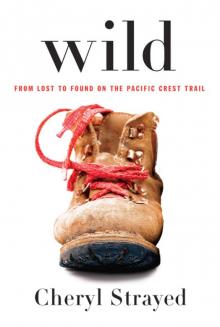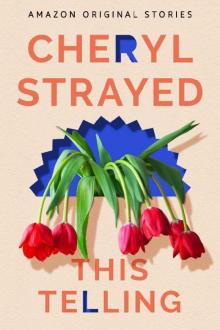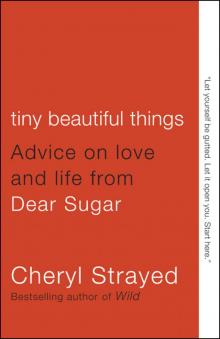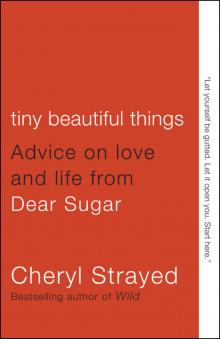- Home
- Cheryl Strayed
Tiny Beautiful Things Page 18
Tiny Beautiful Things Read online
Page 18
One time I was hiking up a mountain in New Mexico. It was March, the trail still covered with snow in places. There was no one around but me for hours until I came upon two people—a man and a woman—who had just come upon each other. We were three strangers who met on a mountain in New Mexico. We got to talking and somehow within the first five minutes of knowing each other we figured out that we all had the same birthday, and not only that, we were born in three consecutive years. As we were talking, three feathers blew up to us on the snow. We picked them up.
What do you do when you don’t know what to do about something?
I talk to Mr. Sugar and my friends. I make lists. I attempt to analyze the situation from the perspective of my “best self”—the one that’s generous, reasonable, forgiving, loving, bighearted, and grateful. I think really hard about what I’ll wish I did a year from now. I map out the consequences of the various actions I could take. I ask what my motivations are, what my desires are, what my fears are, what I have to lose, and what I have to gain. I move toward the light, even if it’s a hard direction in which to move. I trust myself. I keep the faith. I mess up sometimes.
What are your spiritual beliefs?
I do not believe in God as most people conceive of God, but I believe there is a divine spirit in each of us. I believe there is something bigger than our individual selves that we can touch when we live our lives with integrity, compassion, and love.
What would you like to tell us about sex?
Snakes. Hummingbirds. Perhaps a polar bear.
THE MAGIC OF WANTING TO BE
Dear Sugar,
I am a sixty-four-year-old man who has been single for the past five years. My most recent romantic relationship lasted ten years—eight of which were wonderful. My ex had four adult children and three grandchildren. I liked her children a lot and I loved her grandkids. The year after our relationship ended was the most painful time of my life. (This, even though I’d lost my father in high school, spent a year in Vietnam, and watched another lover die of cancer.)
To survive my heartbreak, I started to do lots of community volunteer work. In the past four years, I’ve been involved with hospice, I’ve served on the board of directors of a nonprofit agency that provides services to survivors of domestic violence and sexual assault, I’ve tutored students at a middle school, and I’ve worked at an AIDS hotline. During this time, I’ve had a few dates with women I’ve met via Internet dating services, and found one good friend among them, but no romance. I’ve had one sexual encounter since my ex and I broke up, which I paid for. It wasn’t very satisfying. I miss sex a lot but I also miss having someone to talk with over a meal or coffee.
There’s a new volunteer coordinator at the AIDS hotline where I volunteer and she’s wonderful. She is so exciting that I overcame my fears and asked her out to see a play with me. She said she couldn’t go because she had a friend visiting from out of town. I believed that. I know I should ask her out again since she seemed willing, but one of my fears is that I am old enough to be her father. I don’t want to be a dirty old man!
My counselor said just be light at first—start easy and be funny. Be Cary Grant! she said. But I don’t know if I can do that, Sugar.
I give to lots of people, but I have emotional needs too. I want sex, affection, and emotional closeness. I want someone to care about me. I know people do care about me already, but I want someone special. I want to be loved and to receive love; to have someone there for me. My hunger for this is so great that I fear it’s too much to ask anyone for. I’m afraid that if the volunteer coordinator did go out with me, I’d share all this with her at once, and though she’d be compassionate, she’d be scared off because she’d perceive me as needy. Of course I know that even if the volunteer coordinator and I did start seeing each other, she may not be the person for me or I the person for her.
But I want to take that chance and see. I don’t want my fear to get in the way. What do you think, Sugar?
Fear of Asking Too Much
Dear Fear of Asking Too Much,
Of course you want someone special to love you. A majority of the people who write to me inquire about how they can get the same thing. Some are “hot, smart, and twenty-five,” others are “forty-two, a bit chubby, but lots of fun,” and others “awesome, but in a muddle.” Many are teens and early twenty-somethings whose hearts have just been seriously broken for the first time and they are quite convinced they’ll never find a love like that again. A few are seasoned, experienced grown-ups like you whose faith in the prospect is waning. Unique as every letter is, the point each writer reaches is the same: I want love and I’m afraid I’ll never get it.
It’s hard to answer those letters because I’m an advice columnist, not a fortune-teller. I have words instead of a crystal ball. I can’t say when you’ll get love or how you’ll find it or even promise that you will. I can only say you are worthy of it and that it’s never too much to ask for it and that it’s not crazy to fear you’ll never have it again, even though your fears are probably wrong. Love is our essential nutrient. Without it, life has little meaning. It’s the best thing we have to give and the most valuable thing we receive. It’s worthy of all the hullabaloo.
It seems to me that you’re doing everything right, darling. I plucked your letter out of the enormous how-do-I-get-love pile because I was struck by the integrity with which you describe your situation. You’re looking for love, not letting that keep you from living your life. In the face of your most recent (and considerable) heartbreak, you opted not to wallow. Instead, you gave generously of yourself by committing to work that’s meaningful to you and important to your community. It’s no surprise to me that it was in the course of that work you’ve met someone who genuinely sparks your interest.
So let’s talk about her. The “exciting” volunteer coordinator. I agree with you that you shouldn’t let your fears get in the way of asking her out. Just don’t allow yourself to take it too personally if she says no. I can think of two reasons she might turn you down. One is your significant age difference—many women will date outside their age bracket, but some won’t. The other is your status as a volunteer for the agency that employs her—she may be constrained by workplace policies that prohibit her from dating you, or she may have a personal boundary about doing so (she does, after all, hold a position of professional authority in relation to you).
You won’t know either until you find out. I suggest you ask her on a date without specifying the day or time or occasion, so you can avoid the uncertainty of another impossible-to-interpret “I’d love to but …” scenario. Just tell her that you think she’s great and you wonder if she’d like to go out with you sometime. She’ll either say yes or no or okay, but only as friends.
I agree with your counselor that light and easy is the way to begin—with her and with any woman you ask out—even if you have to fake it for a while.
Which happens to be precisely what Cary Grant did.
He wasn’t born a suave and bedazzling movie star. He wasn’t even born Cary Grant. He was a lonely kid whose depressed mother was sent to a madhouse without his knowledge when he was nine or ten. His father told him she’d gone on an extended vacation. He didn’t know what became of her until he was well into his thirties, when he discovered her still institutionalized, but alive. He was kicked out of school in England at fourteen and by sixteen he was traveling across the United States, performing as a stilt-walker and acrobat and mime. Eventually he found his calling as an actor and changed his name to the one we know him by—the name your counselor invoked because it’s synonymous with male charisma and charm and fabulousness, but he was always still that boy inside. Of himself Grant said, “I pretended to be somebody I wanted to be and I finally became that person. Or he became me. Or we met at some point.”
I suggest you take that approach. It’s not about becoming a movie star. It’s about the down-in-the-dirt art of inhabiting the person you aspire to be while carryin
g on your shoulders the uncertain and hungry man you know you are. Your longing for love is only one part of you. I know that it feels gigantic when you’re all alone writing to me, or when you imagine going out on that first date with a woman you desire. But don’t let your need be the only thing you show. It will scare people off. It will misrepresent how much you have to offer. We have to be whole people to find whole love, even if we have to make it up for a while.
I remembered a younger version of myself as I pondered your letter, FOATM. I recalled a time fifteen years ago, when I was sitting in a café with Mr. Sugar. We’d only been lovers for a month, but we were already in deep, thick in the thrall of the you-tell-me-everything-and-I’ll-tell-you-everything-because-I-love-you-so-madly stage, and on this particular afternoon I was telling him the harrowing tale of how I’d gotten pregnant by a heroin addict the year before and how I’d felt so angry, sad, and self-destructive over having an abortion that I’d intentionally sliced a shallow line in my arm with a knife, even though I’d never done that before. When I got to the part about cutting myself, Mr. Sugar stopped me. He said, “Don’t get me wrong. I want to hear everything about your life. But I want you to know that you don’t need to tell me this to get me to love you. You don’t have to be broken for me.”
I remember that moment precisely—where he was sitting in relation to where I was sitting, the expression on his face when he spoke, the coat I was wearing—because when he said what he said it felt like he’d scooped a hunk of my insides out and shown it to me in the palm of his hand. It wasn’t a good feeling. It had never before occurred to me that I thought in order to get a man to love me I had to appear to be broken for him. And yet when he said it, I recognized it—immediately, humiliatingly—as true. Like truly-uly true. Like how-could-I-have-not-known-this-about-myself-before true. Like what-hole-can-I-go-and-die-in-now true. Because here was a man—a good, strong, sexy, kind, astounding, miraculous man—finally calling my bluff.
You don’t have to be broken for me.
I didn’t have to be broken for him, even though parts of me were. I could be every piece of myself and he’d love me still. My appeal did not rely on my weakness or my need. It relied on everything I was and wanted to be.
Yours does too, sweet pea. Bring your needy self when you go on that next date with a potential lover, but bring all your other selves too. The strong one. The generous one. The one who became fatherless too young and survived a war and lost one lover to cancer and another to the challenges of a decade together, but came out wiser and more tender for it. Bring the man you aspire to be, the one who already has the love he longs for. Play every piece of yourself and play it with all you’ve got until you’re not playing anymore.
That’s what Cary Grant did. The lonely boy who lost his mom in the fog of his father’s deceit found himself in the magic of wanting to be. His name was Archibald Leach.
Yours,
Sugar
A GLORIOUS SOMETHING ELSE
Dear Sugar,
My older brother has terrorized me for as long as I can remember. The worst physical abuse was probably the time he gave me a concussion when I didn’t answer the door quickly enough, after he rang the bell because he was locked out (I was eight, he was twelve). The worst mental abuse was probably the time he killed my pet rat by cutting her neck and stomach open, then put her on my pillow (I was eleven, he was fourteen). There were all kinds of mini-cruelties in between. I literally have no happy memories between us—I have happy memories of my childhood, but none between us. The closest I felt to a brother-sister love was the time he called me a fat greedy cow for eating the last of the cheese. I either hadn’t eaten the cheese, or was trying to deflect his anger, because I protested that it wasn’t me, and he replied that he knew it was me because I was “the person in the house who most loved cheese.” I remember that exactly, because I was shocked that he knew that about me (I did love cheese, still do). So deep was his disdain for me that the realization that I even existed to him when he wasn’t berating or beating me blew my little mind.
My parents did what they could, punishing him when they saw it, but I learned quickly that telling was worse than not telling. If he was punished by them, I’d be punished by him. His behavior worsened as he got older, and it also extended beyond me. He had his first trouble with the law in his early teens, got into drugs, dropped out of high school, and has been in and out of jail, rehab, and mental institutions. By the time I was eighteen, my brother had been arrested multiple times. He had one child and another on the way. I went to college across the country partly to get away from the havoc he wrought.
Now I’m twenty-nine. About a year ago—after ten years of living away from home and learning that just because my brother doesn’t love me doesn’t mean I’m unlovable (something he would often tell me, by the way)—I moved back to my hometown. I’d been living in a big city, with no hope of moving up in a soul-crushing career. I love my parents and my niece and nephew and I missed them. My hometown has a good master’s program in a field I’m interested in and I enrolled. It’s been great. I feel energized living again in a town I love.
My brother hasn’t changed, but I don’t have any contact with him unless he calls me for money or needs help with the kids. My parents aren’t so lucky. They support him in every way possible. He has horrible credit, so they bought a house for him to “rent” from them (of course he never pays). He can’t get a job with his felony record, so they buy him food and pay for day care and anything his kids need (their moms are okay, but can’t support them alone). My parents even bought back the iPods they gave to my niece and nephew for Christmas last year after my brother pawned them.
Of course, he treats my parents just as you would expect a meth/cokehead sociopath to treat people. He steals from them, calls them names, threatens to physically harm them, lies to them about everything and anything. My parents get upset, draw the line, call everything the last straw, but they always give him a second chance because he is their son. Always. He manipulates them with kindness as easily as he manipulates them with terror, and when he does that, things are fine for a week, then get bad again.
Last week it got the worse it’s ever been. My mom wouldn’t give him money—she’d just given him $100 the day before and had nothing more to give—so he threw a wine bottle at her, spit in her face, threw plates on the floor, rampaged through the house, threw their cat against the wall, and destroyed furniture. He left when my mom called the cops, though he stopped to steal beers from the fridge as he went.
Things were strict for a few days: my parents would not return his calls and they would not allow him into the house again, only interacting with his baby mamas in regards to the kids. But, as always, he weaseled his way back in without an apology or even acknowledgment of the incident. Seriously, Sugar, that’s what gets me! These things happen, and he calls them for a favor the next day and pretends nothing was wrong. My parents have long tried to get him help for anything and everything that could help him stop being a lunatic, but he refuses. It’s the rest of the world that has a problem, not him. My parents blame drugs because they didn’t see the worst of him as a kid, like I did. I think he’s just an evil person.
Yet, I would forgive him the nastiness of his brotherhood. Yes, it was beyond anything normal, but we’re adults now, and if he was apologetic and had grown out of his “bullying,” I would have been fine. I would have welcomed a relationship. But I can’t forgive what he’s done to my parents. If anyone else treated them this way, there would be restraining orders and court dates.
This is a long story, Sugar, for a simple question about Christmas.
I want my brother out of my life. I think about what he’s done to my parents and I feel such an impotent rage. While writing this letter to you, I had to leave the computer at points to calm down because my fingers were shaking. I don’t want to sit across the table from someone who’s called my mother a fucking cunt. But as long as my parents let him in, I fee
l I can’t cut him out. We always have a family Christmas, but this year I want to put my foot down. I want to say that I won’t be there when he is. I’ll do whatever my parents want, because I love them, but I won’t do anything involving him, because I love them. I cannot abide anyone who would hurt them. He’s stolen their peace of mind, their belief in themselves as good people, and their identities: literally—having committed such fraud via their credit cards and bank accounts; because they refuse to press charges, their credit is shot.
I worry that refusing to see my brother at Christmas would be an empty gesture and that it would only cause more drama and pain in my parents’ lives. I would miss my niece and nephew on Christmas and I want to make a normal day for them (though I see them all the time, since my parents take care of them 99 percent of the time when my brother has custody). But I don’t know what else I can do.
I feel so powerless—the same way I felt as an eleven-year-old living with someone who threatened to kill me on a weekly basis. I can’t do anything to help my parents, and they won’t do anything to help themselves. I can’t talk to friends about this, because they don’t understand why my parents don’t cut him off. My parents have been told by lawyers, cops, therapists, and friends—and me—that they are enabling my brother and that they should cut ties with him, but they won’t. I’ve given up on trying to change their approach. I just want to feel in control of who I have in my life. I don’t think I should have to pretend to love someone who hurts my parents. Yet I know my parents would be hurt if I refuse to have Christmas with them and my brother. They’d see it as a judgment on them. Sugar, what should I do?
Love and kisses,
C.
Dear C.,
Screw Christmas. Something far more important is at stake. That would be your emotional well-being, as well as the dignity and grace and integrity of your life. It’s such a cliché, but it’s true: you must set boundaries.

 Wild: From Lost to Found on the Pacific Crest Trail
Wild: From Lost to Found on the Pacific Crest Trail This Telling (Out of Line collection)
This Telling (Out of Line collection) Tiny Beautiful Things: Advice on Love and Life From Dear Sugar
Tiny Beautiful Things: Advice on Love and Life From Dear Sugar Tiny Beautiful Things
Tiny Beautiful Things